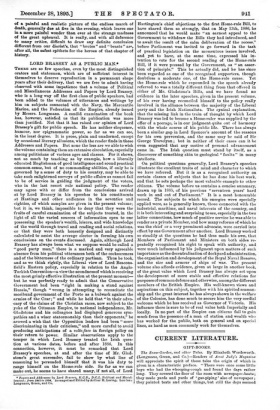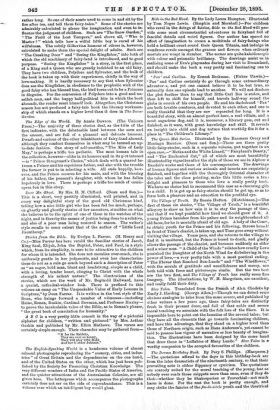CURRENT LITERATURE.
GIFT-BOOKS.
The Snow-Garden, and other Tales. By Elizabeth Wordsworth, (Longmans, Green, and Co.)—Readers of Aunt Judy's Magazine will appreciate the spirit of these tales the origin of which is given in a characteristic preface. "There were once some little boys who had the whooping-cough and found the days rather long. They covered the floor of the room with newspaper-boats; they made yards and yards of 'gas-piping' also of newspaper ; they painted texts and other things, but still the days seemed rather long. So one of their aunts used to come in and sit by the fire after tea, and tell them fairy-tales." Some of the stories are admirably calculated to please the imagination and even to in- fluence the judgment of children. Such are "The Snow-Garden," "The Field of the Lost Tempers," and above all, "Who is Master ? " which tells how a wilful little boy is cured of his wilfulness. The subtly Gilbertian humour of others is, however, calculated to make them the special delight of adults. Such are "The Creaking Door" and" Seeing the Kingfisher," into both of which the old machinery of fairy-land is introduced, and to good purpose. "Seeing the Kingfisher" is a story, in the Brat place, of a King and a Queen who are greatly indebted to an old fairy. They have two children, Polydore and Sylvester, and the bulk of the book is taken up with their experiences, chiefly in the way of love-making. It is hardly necessary to say that when Sylvester does see the Kingfisher, in obedience to the prophetic wish of the good fairy who has blessed him, the bird turns out to be a Princess in disguise. For the conversion of Polydore into a good and un- selfish man, and the happy half-political hits in which the book abounds, the reader must himself look. Altogether, the Christmas season has not produced a fairy-tale book the literary workman- ahip of which stands on a higher level than it does in The Snow- Garden.



































 Previous page
Previous page